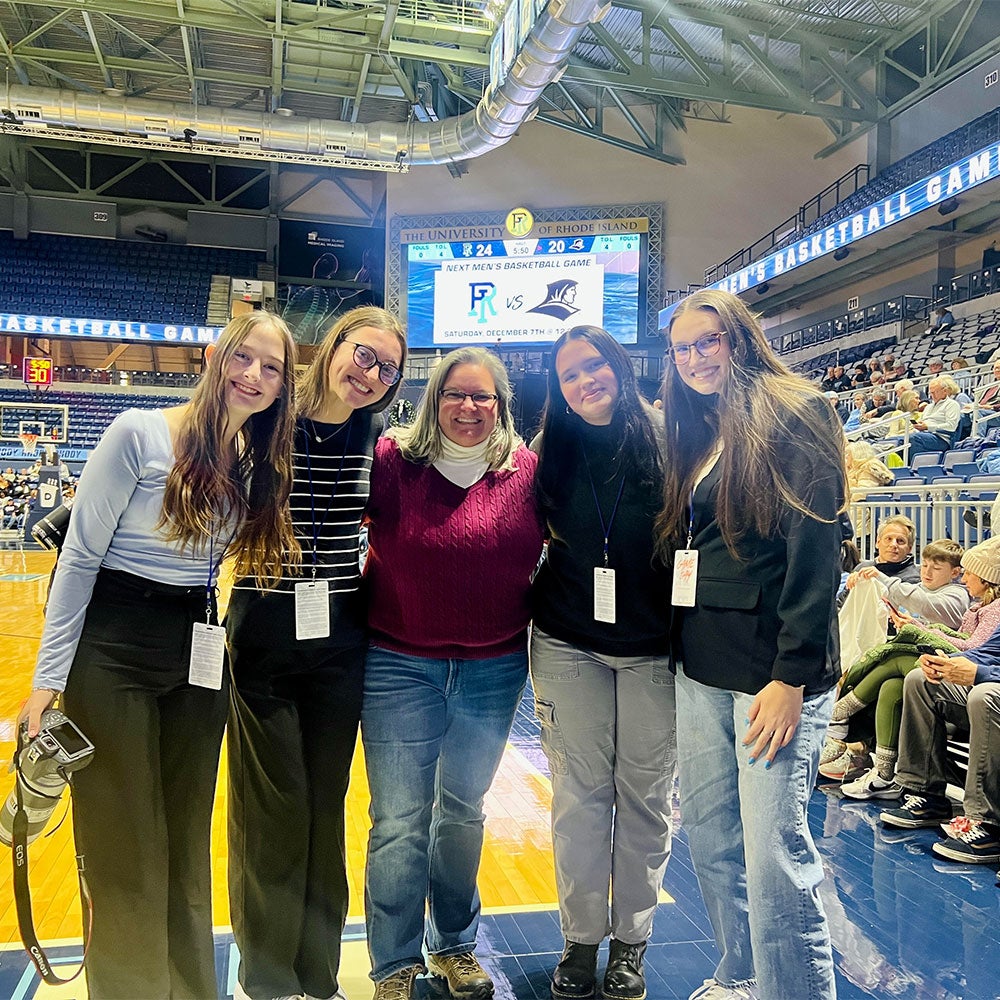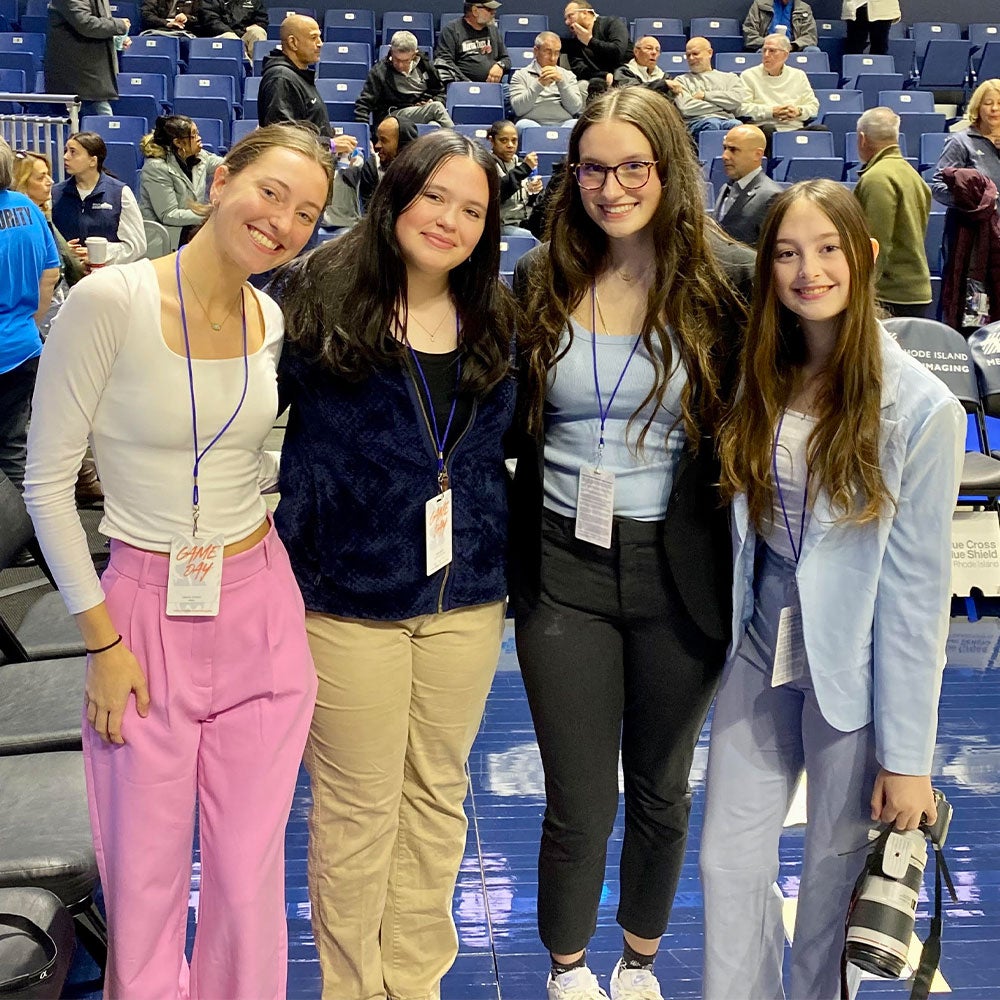KINGSTON, RI – DEC 18, 2024 – Sports media and communication is an increasingly popular area of study at the Harrington School, and offers ample opportunities to build a portfolio both in and outside of the classroom. Students can intern directly with the URI football team, join sports clubs, cover sports events for the The Good 5 Cent Cigar, and report sideline at games, just to name a few.
While finding footing in any area of study is par for the course in an undergraduate career, several young women interested in sports media on campus began to notice a sense of imbalance between themselves and their male peers. Whether it be feeling invisible on the sidelines of a college game trying to capture photos, being continuously talked over by male counterparts in radio broadcasts, or generally feeling unwelcome in spaces intended for all sports lovers; these experiences were enough to take action.
Brigid Locke (president), junior in sports media and data science; Nora Kelley (vice president), sophomore in sports media and communications; Grace Siorek (treasurer), sophomore in sports media and public relations; and Emma Roberts (secretary), freshman in sports media and communication, took their futures into their own hands and formed a new organization on campus, the Women in Sports Group.
“These events, especially within our major being so male dominated, have a tendency to have women be sidelined. So, I think our club is here to take a stand and say that we’re here to take up space,” said Kelley.
The group meets biweekly where all genders interested in sports (regardless of their major) are welcome. It’s a safe space designed for those who feel their voices are ignored, to air shared grievances, an opportunity to participate in workshops, learn from guest speakers, and to “nerd out” over their love of sports. In the spring, the organization hopes to host speakers such as Tammi Reiss, URI women’s basketball coach and Olympic Bronze Medalist, as well as other URI alum from the Harrington School and the Athletic Department to discuss their career journeys and insights.
Up until recently, 4% represented the amount of time women’s sports took up space in the sports broadcasting industry. According to a 2022 Wasserman Report, “From the Shadows to the Spotlight,” women’s sports received an average share of 15% of media coverage. With nearly triple the amount of coverage in such a short period of time, women’s sports is brimming with optimism.
However, the issue of inequality and sexism still plague the industry when it comes to women behind the scenes who provide coverage, writing, and on-camera commentary. While this has been a permeating issue for decades, the internet and social media kicked overt sexism into overdrive. Negative and offensive comments could easily be slingshot into the ether with anonymity, and would further bleed into the “real life” experiences of women sports journalists.
“The microaggressions that have peppered my 16-year career and those of my female friends and contemporaries still very much exist, with the constant need to prove yourself more than an equally or less-qualified man,” said sports broadcaster, Rebecca Adams, in an op-ed piece published in the Guardian. “It’s not that women lack the skill or ambition, but there is seemingly always an extra hoop to jump through to show those hiring that you are capable. Men are simply not criticised in the same way.”
On the URI campus, the young women reiterate that the issue at hand is not due to a lack of female interest in sports. Rather, they feel as though there is a culture in which women are (consciously or subconsciously) not welcomed into these spaces. One of the founders recalls a time where she was at a game with her camera, and male videographer looked directly at her and stood in her shot.
“It was happening to me, too!” chimed in freshman Emma Roberts. “That’s how I met Nora, and we bonded over our frustrations as female sports photographers. Talking with her was so refreshing because it made me feel less alone.”
The group began to take shape with the help of faculty, Molly Yanity, professor and director of sports media and communications. Originally from Athens, Ohio, Yanity completed her undergraduate degree at Point Loma Nazarene College in San Diego. She spent over a decade and a half as a sportswriter on the West Coast, including her time at the Seattle Post-Intelligencer, which closed in 2009. During this time, she was part of a professional organization known as the Association of Women in Sports Media (also known as AWSM, or “Awesome”). Following this, Yanity pursued graduate studies at Ohio University, earning both a master’s degree and a PhD. After 11 years at Quinnipiac, she landed at URI, where she embraced the opportunity to take on a new role and a fresh challenge.
While Yanity herself didn’t report any instances of being on the receiving end of sexism in the workplace (she transitioned out of the field in 2009 just as Twitter entered the zeitgeist), she remembers a specific incident that would connect her to Jenni Carlson – the future president of AWSM.
“It happened in college football, where a female sports columnist was targeted in a press conference. I remember sitting in a room with all of the male sports writers and we didn’t know who the reporter was at the time, but I was watching how this coach was speaking to her,” said Yanity. She pointed out to her colleagues that she knew the coach was speaking to a woman; the others were confused. “He’s asking about if she has children and making it sound derogatory or shameful that she doesn’t [have them]. This would never be an issue for a man.”
Later on, Yanity started a student chapter of AWSM at Quinnipiac. The group won the student chapter of the year against much larger state schools with expansive athletic programs. Many of those young women are now working in sports media or journalism to this day. It became important to her to start something like this at URI.

When Yanity was interviewed for her role, she was asked how she would promote diversity. The response did not take much time to conjure, as one of the most glaring elements of sports media and communication is that it is extremely white, male dominated. As a white woman who spent a large portion of her professional life in sports journalism, her goal is to get more young women involved.
In most “boys’ club” atmospheres, women can easily be pit against each other, but this group is smarter than that. They know that through support and uplifting each other is where the real magic can happen. ESPN basketball host, Malika Andrews, spoke to this in a 2022 feature about women in sports broadcasting:
“I found women in this industry to be incredibly supportive. I think that idea became prevalent because there’s an endless number of men on any given panel, but there’s usually just one woman. But women are imaginative; we can see ourselves in all sorts of spaces, and we’ve worked to put ourselves in spaces that we weren’t in before, but the network’s imaginations at times have lagged behind the capabilities of what women can do.”
The Women in Sports group is just the beginning of a student-led shift in equality, but also serves as a beacon for those hoping to break into the field upon graduation. The four founders came together because they were often the only women consistently present for coverage at URI sports events. It is through their solidarity and support that their careers can thrive.
Each founding member of the group has exciting career plans spanning from data management for a MLB team, to photography for the NBA, to on-camera broadcasting, to marketing and branding on social media. Perhaps the most exciting element of their individual career paths is the time and space they have left to nurture their passion at URI. With opportunities to double and triple major, internships and fellowships, and raw ambition to excel – building hard skills in sports media, as especially as a young woman are important. However, advocacy and community are the true building blocks to a successful professional career.
“In five years, I hope this club is nationally recognized as a chapter, which we’re already on the path to become one in the spring. I would like those who join our group to feel comfortable and I want them to be able to advocate for themselves and never feel like they need to be quiet because another person of the opposite gender is speaking deserves that space more,” said Locke, president.

